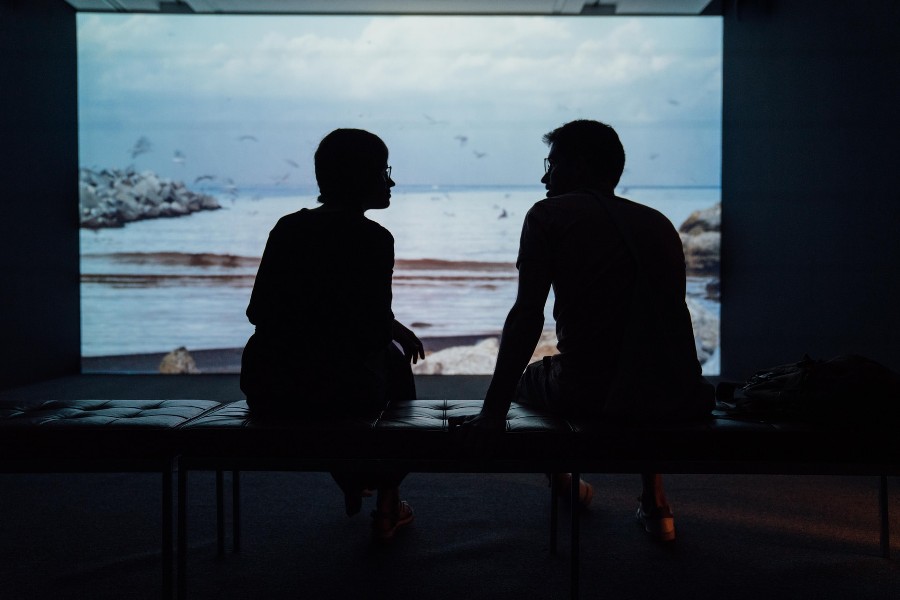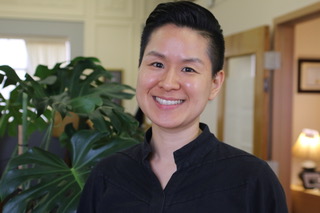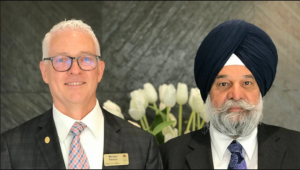
Someone recently paid me an unexpected compliment: “Grace, did you know you’re a great listener?” As I was preparing to respond, “Ahh, that’s sweet of you,” I took a minute to pause and ask myself, “Am I a good listener?” I admit that one of my strengths is listening rather than dominating a conversation with my opinions or advice, but what I rarely admit is that I’m also good at appearing to be paying attention—the frequent head nodding, the interspersed reactions, “right,” “I know,” “exactly,” or the direct eye contact to assure the other person that I’m in complete agreement with their story.
What comes in through my senses and how I choose to engage with it are locked in a silent battle. I can be conversing with a friend, family member, or colleague, all the while drifting into thoughts of whether my Amazon package has arrived on my doorstep, or random thoughts with little connection to what is being said at the moment. If my attention hasn’t wandered, there’s a good chance I’m on a mission to come up with an extremely brilliant and insightful response to what you said, or to devise a “perfect solution” to the problem you haven’t yet solved. Although my frequent distractions and mind wandering haven’t resulted in any severe disputes or broken relationships, I now see that I’ve lost out on creating curious places where we might open up and make a spiritual connection.
But I can’t say I blame myself. As Ernest Hemingway so eloquently put it: “When people talk, listen completely. Most people never listen. ” I’d point out to Hemingway that we weren’t taught how to be active listeners in school when we were kids. Sure, we were taught to respect others and to give people the opportunity to speak without criticizing or interrupting them. But I don’t recall learning that deep listening may be a gift of love, or that by practicing deep listening with an open mind, we can learn something new.
Which reminds me of a story.
Many years ago, I was invited to talk to a group of military officers on the topic of meditation. It was a cold morning, and there were more people in attendance than the little classroom could comfortably accommodate. As I stood up in front of the class to speak, I noticed many heads turning away in disinterest, young men whispering to their neighbors, and drooping heads from lack of sleep.
One student in particular caught my attention as he was one of those tall types who seemed, standing up, to be seven feet tall, and who’d make a great leader. He was also one of the few officers paying attention and listening attentively. He made eye contact and his posture leaned in as if to say, “I’m open to learning more.” I continued to lecture with vigor, thanks to knowing that at least one person was listening. As the lecture ended, I became increasingly fascinated by what I had experienced and learned that day—with a deep listener, one’s inner reality no longer feels invisible.
One of the lessons from living in the time of COVID-19 is that it’s easy to fall into a life that feels invisible and disconnected from others. On the one hand, we recognize that “we’re all in this together” in the event of a pandemic, but we can still detect a waning sense of shared humanity. Fear can generate an us-versus-them mentality, which reinforces feelings of isolation and disconnection. What we do know is that we are social beings who have an unavoidable need to feel true love and belonging, and that when we don’t have either, we suffer.
Deep listening is the kind of listening that can help relieve the suffering of another person.
Thich Nhat Hanh
Deep listening allows us to hold space for people to share their most authentic selves without compromising who they are. It is true compassion to listen without controlling what is being said. When we release the need to control the situation, we start to hear what’s true and open our eyes to who’s there in front of us, which requires complete involvement. We can’t be lost in thinking or in our inner discourse and still listen fully. An active listener asks herself, “Am I here?” Am I quiet inside so that I can hear you? Am I allowing you to fully express yourself?
This is especially important to someone like me, a child of Korean immigrants who found herself at many times and in many spaces feeling “different.” But back then, I wasn’t equipped with the critical vocabulary as to why I was feeling a certain way. I just knew that it was a painful human experience. The only spaces in which I felt safe were the ones where people didn’t expect me to be obedient, quiet, and unassuming. The only spaces I felt heard were the ones where people didn’t box me into a history fraught with pain, obscurity, invisibility, and erasure. These were spaces where people were open to listening to my story and valued me as an equal. Spaces that helped me feel connected to a larger humanity were grounded on the traditional South African wisdom of ubuntu—I am because you are.
Throughout my life, I’ve observed that we all want to be better people—we want to help others, we want our presence to be helpful, not harmful; we want to make fewer mistakes in our interactions with others. Deep listening is a skill that needs to be honed repeatedly. I try not to feel discouraged if I become sidetracked or lost in thought. It happens. We’re all of us humans—we lament about the past, worry about the future, tune out in conversations. But I’m realizing that as I navigate through trying times and live among people of diverse backgrounds and experiences, it’s important to hone the skill to be more present through listening that’s grounded in the truth that absolutely everything is fundamentally interdependent. This means realizing that deep listening is a practice that requires relentless self-examination, constant inquiry, learning, and a willingness to become a better version of ourselves.
The Buddha exemplified pure presence to the fullest extent possible. The first section of the Diamond Sutra describes the Buddha’s presence as he put away his robe and begging bowl, washed his feet, spread his seat, and sat down, mindfully fixing his attention in front of him. In contemporary terms, I see this as a person who pours their coffee, washes their hands, prepares their seat, and sits down, ready to listen to the person in front of them. They will not overlook the other nor will they judge them. They will make the other feel at home. And it could be this simple intention to listen that heals someone who has had a rough week, and the one gesture that says, “I see you.”
Related features from BDG
The Dharma of Listening and Speaking, Part Two
The Dharma of Listening and Speaking, Part One
Harmonic Presence: Qualities of Silence, Listening, and Sound with David Hykes
Listening to Ourselves and Our Teachers
Silence












